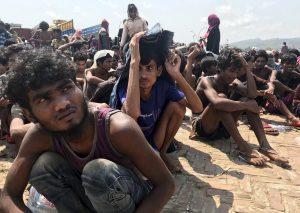Several airlines offer direct flights from Myanmar to Malaysia, but many Rohingya Muslims like Sharifah Shakira can only make the journey by using human traffickers. At the age of five, Shakira’s mother had her smuggled out of Myanmar to protect her from the military’s ongoing genocidal campaign against Rohingya Muslims. In the trunk of a car, trekking through jungles, and at the bottom of a boat, Shakira made the journey for her life to the shores of Malaysia.
Unfortunately, while she made safe passage, she received a far from warm welcome. Xenophobia and discrimination are distressingly common occurrences for refugees fleeing to Malaysia to escape religious persecution.
According to the UN Refugee Agency, Shakira is one of what are now approximately 101,280 Rohingya Muslim refugees and asylum seekers in Malaysia.
Malaysia is not a signatory of either the 1951 United Nations Convention Relating to the Status of Refugees or the 1967 Protocol Relating to the Status of Refugees. Nevertheless, the government had long guaranteed the safety of thousands of refugees and asylum seekers — especially those fleeing religious and ethnic-based violence. That, however is now changing.
Public attitudes have turned against migrants. Businesses have fired or refused to hire Rohingya. Malaysian authorities recently rounded up 2,000 migrants, around 800 of whom were from Myanmar. Under the guise of preventing new COVID-19 outbreaks, Malaysian authorities have turned away boats filled with Rohingya refugees. Survivors from the boats who do make it ashore tell of horror at sea, where dozens die and are thrown to a watery grave. The refusal of Malaysian authorities to admit the boats harkens back to 2015, when hundreds died out at sea in what the United Nations dubbed “floating coffins.” Hundreds more could die now.
Unfortunately, the Rohingya are not alone; 6,650 Ahmadi Muslim refugees from Pakistan also face increased hostility in Malaysia. The Pakistani constitution declares the Ahmadiyya faith to be “non-Muslim” and Ahmadis are at risk of being prosecuted for blasphemy. Yet, the Malaysian government views these Ahmadis as “illegal migrants,” not refugees. If Malaysia deports them back to Pakistan, they face very real threats to their physical safety merely based on their religion.
Even if they are permitted to remain, Ahmadis face the same state and societal discrimination in Malaysia as native-born Ahmadis. The Malaysian constitution enshrines Sunni Islam as the official state religion. Authorities regularly place a hateful Ahmadi slur, Qadiani, outside Ahmadi faith centers, and state-issued Friday sermons often denounce the Ahmadiyya faith. Yet, the living conditions for Ahmadi Muslims in Malaysia are still safer than in Pakistan, where the persecution goes beyond such hateful slurs and denouncement.
During a global summit of Muslim leaders held in Kuala Lumpur last December, then-Prime Minister Mahathir Mohamad bemoaned the plight of millions of Muslim refugees. Yet neither his administration nor the current government of Prime Minister Muhyiddin Yassin has made a concerted effort to take in the refugees, predominantly Rohingya and Ahmadi Muslims, fleeing persecution. The 36th ASEAN Summit, held virtually on June 26, also failed to mention the ongoing Rohingya refugee crisis, even as Malaysia continued to turn away boats. While we urge the Malaysian leadership to take action, the United States also has an important role to play.
In our 2020 Annual Report, the U.S. Commission on International Religious Freedom (USCIRF) recommended that the U.S. government expand capacity-building programs and religious freedom trainings for Malaysian government officials, especially security authorities. It would be particularly helpful for USAID and the U.S. Department of State to provide humanitarian support and funding to help cover the handling and processing of refugee cases in Malaysia.
In addition, the United States should make advocacy for the rights of refugees and asylum seekers abroad a core part of its religious freedom diplomacy. We strongly urge the administration to extend its admirable commitment to advancing religious freedom to its global refugee resettlement policy by once again resettling 95,000 of the most vulnerable refugees to the United States each year, the previously typical number. Refugees are some of the most vulnerable victims of religious freedom violations and we must work to ensure that they are safe and free from persecution.
Gayle Manchin is the Chair on the United States Commission on International Religious Freedom.
James W. Carr is a Commissioner on the United States Commission on International Religious Freedom.

































